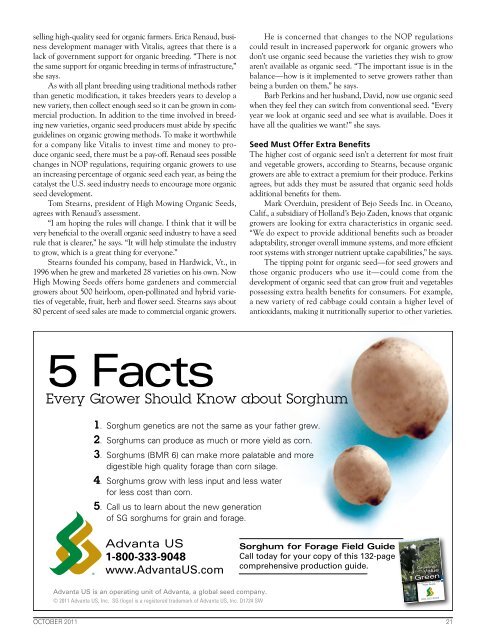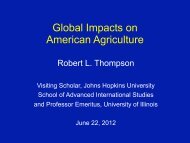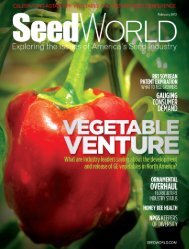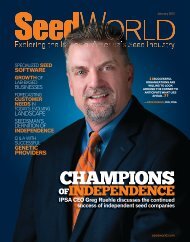Wet Chemistry Soybean Series - Seed World
Wet Chemistry Soybean Series - Seed World
Wet Chemistry Soybean Series - Seed World
- No tags were found...
Create successful ePaper yourself
Turn your PDF publications into a flip-book with our unique Google optimized e-Paper software.
$14.95selling high-quality seed for organic farmers. Erica Renaud, businessdevelopment manager with Vitalis, agrees that there is alack of government support for organic breeding. “There is notthe same support for organic breeding in terms of infrastructure,”she says.As with all plant breeding using traditional methods ratherthan genetic modification, it takes breeders years to develop anew variety, then collect enough seed so it can be grown in commercialproduction. In addition to the time involved in breedingnew varieties, organic seed producers must abide by specificguidelines on organic growing methods. To make it worthwhilefor a company like Vitalis to invest time and money to produceorganic seed, there must be a pay-off. Renaud sees possiblechanges in NOP regulations, requiring organic growers to usean increasing percentage of organic seed each year, as being thecatalyst the U.S. seed industry needs to encourage more organicseed development.Tom Stearns, president of High Mowing Organic <strong>Seed</strong>s,agrees with Renaud’s assessment.“I am hoping the rules will change. I think that it will bevery beneficial to the overall organic seed industry to have a seedrule that is clearer,” he says. “It will help stimulate the industryto grow, which is a great thing for everyone.”Stearns founded his company, based in Hardwick, Vt., in1996 when he grew and marketed 28 varieties on his own. NowHigh Mowing <strong>Seed</strong>s offers home gardeners and commercialgrowers about 500 heirloom, open-pollinated and hybrid varietiesof vegetable, fruit, herb and flower seed. Stearns says about80 percent of seed sales are made to commercial organic growers.He is concerned that changes to the NOP regulationscould result in increased paperwork for organic growers whodon’t use organic seed because the varieties they wish to growaren’t available as organic seed. “The important issue is in thebalance—how is it implemented to serve growers rather thanbeing a burden on them,” he says.Barb Perkins and her husband, David, now use organic seedwhen they feel they can switch from conventional seed. “Everyyear we look at organic seed and see what is available. Does ithave all the qualities we want?” she says.<strong>Seed</strong> Must Offer Extra BenefitsThe higher cost of organic seed isn’t a deterrent for most fruitand vegetable growers, according to Stearns, because organicgrowers are able to extract a premium for their produce. Perkinsagrees, but adds they must be assured that organic seed holdsadditional benefits for them.Mark Overduin, president of Bejo <strong>Seed</strong>s Inc. in Oceano,Calif., a subsidiary of Holland’s Bejo Zaden, knows that organicgrowers are looking for extra characteristics in organic seed.“We do expect to provide additional benefits such as broaderadaptability, stronger overall immune systems, and more efficientroot systems with stronger nutrient uptake capabilities,” he says.The tipping point for organic seed—for seed growers andthose organic producers who use it—could come from thedevelopment of organic seed that can grow fruit and vegetablespossessing extra health benefits for consumers. For example,a new variety of red cabbage could contain a higher level ofantioxidants, making it nutritionally superior to other varieties.5 FactsEvery Grower Should Know about Sorghum1. Sorghum genetics are not the same as your father grew.2. Sorghums can produce as much or more yield as corn.3. Sorghums (BMR 6) can make more palatable and moredigestible high quality forage than corn silage.4. Sorghums grow with less input and less waterfor less cost than corn.5. Call us to learn about the new generationof SG sorghums for grain and forage.Advanta US1-800-333-9048www.AdvantaUS.comAdvanta US is an operating unit of Advanta, a global seed company.© 2011 Advanta US, Inc. SG (logo) is a registered trademark of Advanta US, Inc. D1724 SWSorghum for Forage Field GuideCall today for your copy of this 132-pagecomprehensive production guide.GrowingValueGreenin theSorghum for ForageField Guide800.333.9048october 1724_SW-horiz.indd 2011 18/17/11 2:36:18 PM21






